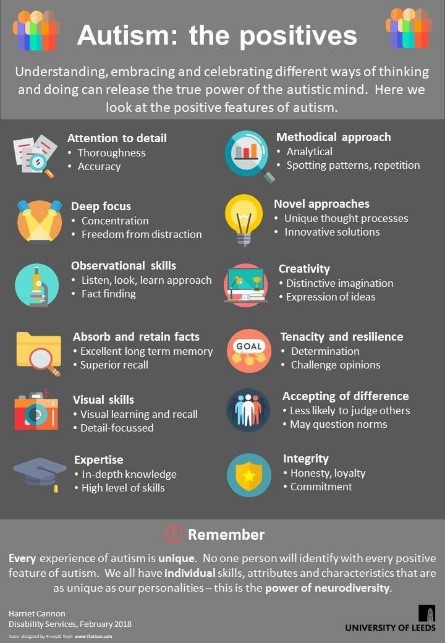Autism Spectrum
Autism is a lifelong spectrum ‘disorder’ or ‘condition’* related to differences in the way the brain develops. An individual on the autism spectrum is affected to different degrees and in different ways. People on the autism spectrum are all unique - the characteristics identified below vary from person to person. ‘Asperger’s syndrome’ used to be treated as a distinct diagnosis but is now included under the broader umbrella term ‘Autism spectrum’.
People on the autism spectrum may have the following characteristics:
- Differences in social communication
- Differences in social interaction
- Differences in Interests and information processing
- Differences in processing sensory information
For many people on the Autism spectrum, these differences can cause a great deal of anxiety. For example understanding unwritten social ‘rules’, body language or hidden meanings can be more difficult, with a tendency to take things literally in interactions with others. This can leave those on the Autism spectrum feeling misunderstood and isolated, whilst sometimes finding social situations exhausting.
It is common for those on the Autism spectrum to have routine and focussed interests or hobbies which can become very absorbing and can lead to in depth specialist knowledge developing in certain areas. They may also find that they are very good at giving thorough and precise attention to detail, while sometimes finding it harder to see the ‘bigger picture’.
People on the Autism spectrum may find that they are either over or under-sensitive when it comes to processing sensory information. For example, background noise or competing sounds may be exaggerated and become overwhelming at times, or where taste buds are not easily stimulated, there may be an attraction to consuming food and drink with very strong, intense flavours.
Leaving home and starting university can be a stressful time for any student. Students on the Autism spectrum often find this transition particularly challenging, as change is one of the most difficult processes to deal with. It means a complete change of established routines and learning how to cope in a new location, new study environment, with new people and, often, a new place to live. For this reason it is important for these students to build on their internal skills set to help to cope with such changes. Many Universities (including Warwick) offer transition programmes and other forms of support to enable a smoother transition to University. You can find out more here about Autism specific support offered at Warwick.
This video produced by the National Autistic society aims to show how it might feel to experience sensory overload.
The poster below has been produced by the University of Leeds to highlight some of the positives about being on the Autism spectrum.

*There is much debate over terminology that relates to autism, with some people preferring not to use the terms ‘disorder’ or ‘condition’. Such terminology can be experienced as being medicalised in nature, highlighting perceived ‘deficits’ of those on the autism spectrum rather than acknowledging specific characteristics as ‘differences’ which form integral parts of a person’s identity.
Useful Resources
|
At the University of Warwick |
|
|
The Disability Services team provides advice, guidance and mentoring for students on the Autistic spectrum |
|
|
|
|
|
Other Resources |
|
|
‘Mind’ in Coventry and Warwickshire run peer support groups and education programmes for those who are on the Autism spectrum or believe they may be |
|
|
Information and support related to Autism including issues related to Gender and Autism |
|
|
Advice and information for young people on the Autism spectrum |
|
|
Website offering access to free on-line courses including some about Autism |
